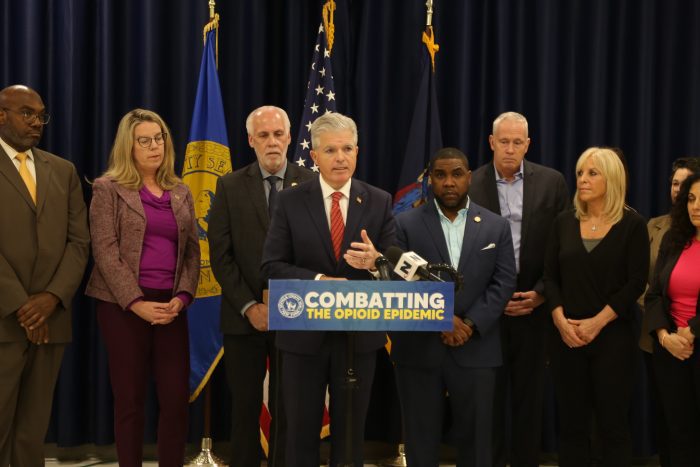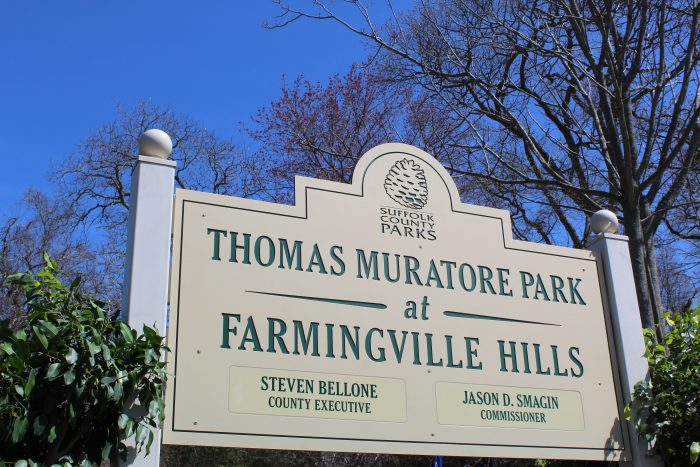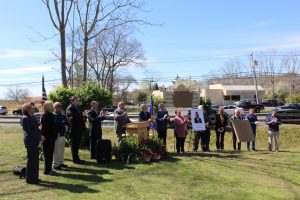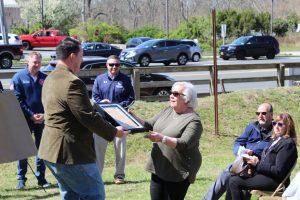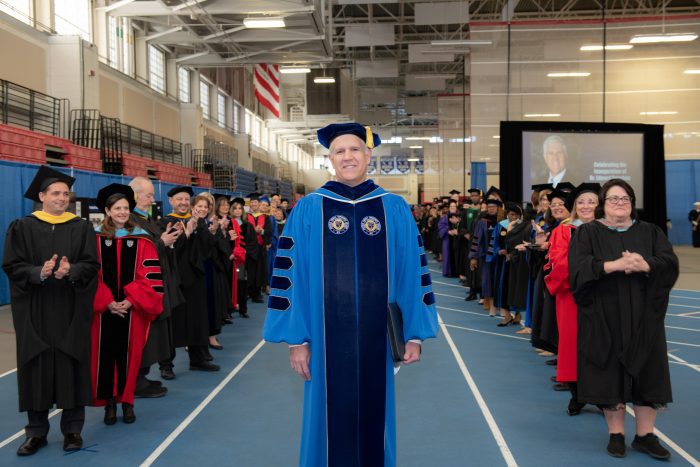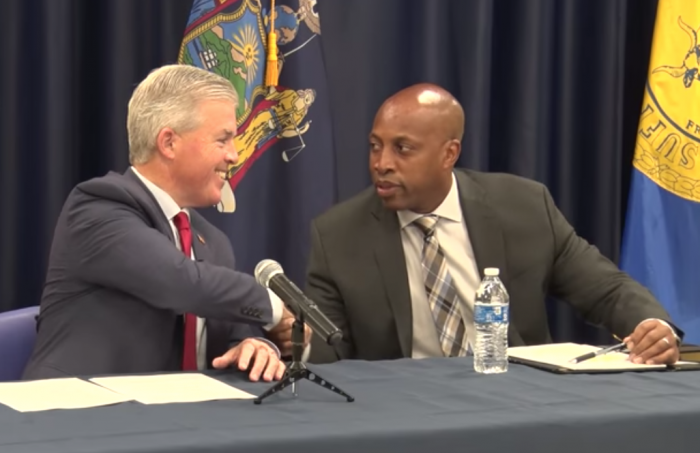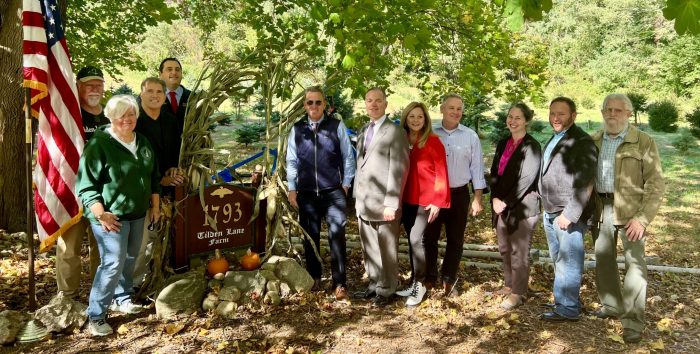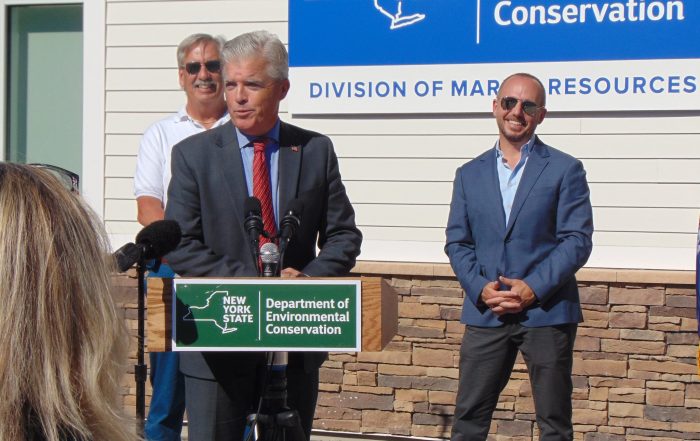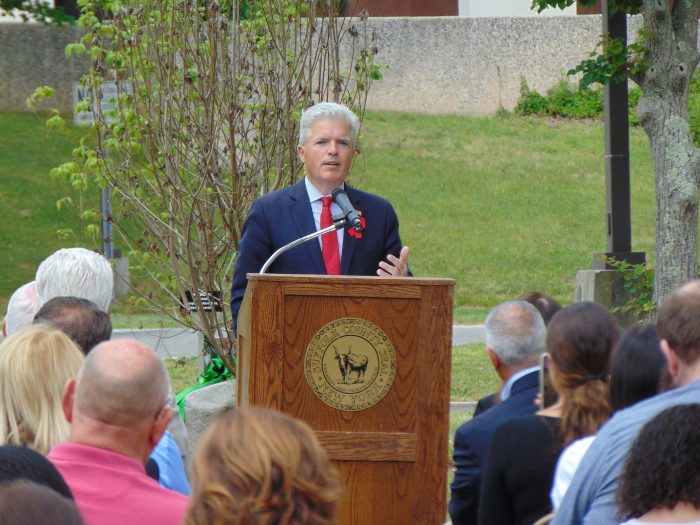County Executive Steve Bellone (D) announced the names of 34 organizations who will receive $25 million to combat the opioid crisis in the first round of funding secured by the county’s settlement against manufacturers, distributors and others involved in the crisis.

The grant recipients, who were among the 111 that applied for funding, include community groups, nonprofits, for-profit groups and county agencies and will receive the funds over a three-year period.
The county hopes to provide funds in the next couple of weeks to combat a crisis that COVID-19 exacerbated in the last few years.
“We had begun to make real progress in the battle and in 2019, deaths declined for the first time in many years,” Bellone said at a press conference Jan. 12 announcing the recipients chosen by a bipartisan five-member committee. The pandemic “reversed that progress and, once again, we saw opioid-related deaths rising.”
Funds from the settlement against manufacturers and distributors of opioids total over $200 million, which the county will distribute over the next 20 years. The second round of funding will begin later this year. The county encouraged some of the groups that didn’t receive funding in the first round to reapply, while opening up the opportunity to other organizations that are similarly dedicated to prevention, education, treatment and recovery.
Urgency
County Legislature Minority Leader Jason Richberg (D-West Babylon), who helped select award recipients, said the committee received over $170 million worth of requests.
“The goal is not only to have an immediate impact, but to have a long-standing impact,” he said in an interview. The committee wanted to take a “multifaceted approach when funding these organizations.”
Richberg said the group took a considerable number of hours to put together the list of recipients for the first round.
“We understood the urgency to make sure this came out in the best way possible,” he said.
The minority leader appreciated the perspective of fellow committee member Sharon Richmond, president of the Northport-East Northport Community Drug and Alcohol Task Force and a victim-advocate whose son Vincent died from opioids in 2017.
Richberg described Richmond as a “beacon of strength” who helped guide the group in the right direction.
At the press conference, Richmond said her son would have been “honored to know that so many people are going to get so much help” with these funds.
‘We want to reach individuals in the community and not necessarily have to wait for someone to come to our emergency departments.’
—Dr. Sandeep Kapoor
Reaching out
The leaders of the groups that will receive this money have numerous approaches to combat an epidemic that has robbed the community of family members, friends and neighbors.
“We want to reach individuals in the community and not necessarily have to wait for someone to come to our emergency departments,” said Dr. Sandeep Kapoor, assistant vice president of addiction services for Northwell Health.
Northwell’s Project Connect Plus will receive about $3.5 million, which is the largest single award in the first round of funding.
Project Connect Plus would like to expand its reach and is partnering with domestic violence organizations and with Island Harvest food bank to create a pathway for people to access support.
“The goal of this initiative is to make sure we can navigate people [to services], build partnerships and ensure that people trust the process,” Kapoor said.
Project Connect Plus is emphasizing the importance of ongoing contact between health care providers and people who need support to defeat drug addiction.
He contrasted the attention most patients get after an operation with the lack of ongoing attention in the health care system for those people who come to an emergency room for drug-related problems.
‘It’s a significant amount of money that will have a significant impact. It means a lot to us to have the support of the county around harm reduction efforts.’
— Tina Wolf
Hospitals typically reach out to patients numerous times after knee operations, to check on how people are feeling, to make sure they are taking their medicine, to check for infection and to remind them of future appointments.
Someone with a substance use disorder typically receives no phone calls after an emergency room visit.
“If [the health care community] is doing right by people with knee surgery, why not take the same approach” for people who are battling addiction, Kapoor said. “We continually engage people to make sure they are not alone.”
Project Connect Plus is also partnering with other organizations, including Community Action for Social Justice, which is working toward increasing safety around drug use.
CASJ’s executive director and co-founder, Tina Wolf, provides direct services to reduce the risk for people who use drugs, such as syringe exchange and risk reduction counseling, overdose prevention training and harm reduction training.
CASJ is receiving $1.5 million from the opioid settlement.
“It’s a significant amount of money that will have a significant impact,” Wolf said. “It means a lot to us to have the support of the county around harm reduction efforts.”
Wolf said the funds will enable CASJ to double its existing harm reduction efforts in Suffolk County, which is important not only amid an increase in substance abuse in the aftermath of the pandemic, but also as people develop wounds amid a change in the drug supply.
In the last few years, amid volatility in drugs used in the county, some fentanyl has included xylazine, a pet pain reliever and muscle relaxant. In Philadelphia, Puerto Rico and Long Island, among other places, xylazine has caused significant nonhealing wounds.
“Some of this money is for wound care issues,” Wolf said.
Other grant recipients include Hope House Ministries of Port Jefferson ($600,000), Town of Brookhaven Youth Prevention Program ($75,000) and Town of Smithtown Horizons Counseling and Education Center ($111,000).
A comprehensive list
The award recipients will update the committee on their efforts to ensure that the funds are providing the anticipated benefits and to help guide future financial decisions.
Groups have to report on their progress, Richberg said, which is a part of their contract.
County Legislator Kara Hahn (D-Setauket) was pleased with the work of the recipients.
“It’s a fantastic list” that is “really comprehensive and varied in the type of services and the location geographically,” she said. “We do need so much out there.”
She believes the funds will “do some
real good.”
Wolf said she hopes “we don’t all just do well in our individual projects, but we can link those projects together. I’m hoping there’s enough overlap that we can create this net together to really make sure people aren’t falling through the cracks.”

